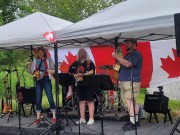By Mike Anderson
The Town is moving forward with its plan to have road-end beach associations along Lake Drive lease or purchase the Town-owned shoreline they access.
On Sept 20, Council approved a staff report by Trevor Jacobs, a senior project manager who is stick handling the Town’s Lake Drive Shoreline Action Plan.
The report recommended that 27 Lake Drive beach associations incorporate as not-for-profit organizations, making it easier for the Town to enter into long-term lease or sales agreements.
According to the report, staff will consult with the beach associations in November and report back to council in Q1 2024.
At that time, staff will also seek council direction on leasing or selling the shoreline to beach associations. According to Jacobs, these will be the only two options for council to consider.
However, the Town’s plan is drawing fire from a former 3-time ward councillor.
Dave Szollosy, who is also past president of the Fairbank Beach Association, says road-end beach associations should be left alone and the status quo maintained.
“The proposal completely ignores local history, resident culture, and the pragmatic reality,” Szollosy said in an email to the Post.
“For many decades, residents living along streets perpendicular to Lake Drive have enjoyed a sense of ownership and responsibility for the Town-owned waterfront. These small access points have been instrumental in building community among the local residents as they came together to maintain and improve those lots,” he said.
“These loosely organized volunteer groups exist to meet community need, not manage a legal non-profit body. People are currently generous with their time in calling on their neighbours. Putting bureaucratic responsibilities into the positions will scare potential association presidents away.”
Szollosy also argues the Town is trying to re-float a plan that was declared “unfeasible” by the Lake Drive Shoreline Jurisdiction Ad Hoc Committee, a citizen’s group that was established in 2015 to gather public input and provide recommendations to council on how to resolve the Lake Drive shoreline dispute.
While incorporation would transform beach associations into “legal entities,” making it easier for the Town to enter into binding legal agreements, setting up and running a non-profit corporation could be challenging for many less established beach associations.
It would require filing audited financial statements, keeping minutes, and appointing a board with a president, secretary and treasurer.
Beach Associations would also incur additional administrative, legal and insurance costs, necessitating a hike in annual fees.
Currently, most beach associations charge a nominal annual fee to cover maintenance and repairs, usually between $40 to $50 a year.
However, the costs associated with running a not-for-profit organization pale compared to the added cost of purchasing or leasing the shoreline.

Lucy Loren, president of the Farley Circle Beach Association, says whether it’s a lease or a buy, there’s a “very strong possibility” her membership fees will have to go up.
“If they’re doing a buy, we have to dig in further to find out what members are willing to spend, or if it’s a lease, how much it will be,” she said.
Like Szollosy, Loren would prefer to see the status quo maintained. But she’s prepared to work with the Town to preserve her beach association, which will celebrate its 60th anniversary in 2025.
“It would be great if we’re left to attend to it like we have for decades,” she said. “But we can’t control what the Town does.”
“We’re just waiting on what the Town decides. We’re prepared for either decision.”
However, Loren sees problems with both options.
“What’s the benefit of a sale? Everyone puts in x amount of dollars. Now, everyone owns a piece. What if the homeowner moves? What do they do? Do they incorporate that within their sale and give the new people all the paperwork?”
While she believes leasing might be a better option, Loren says some members may not be willing to pay the higher fees.
“Fees would go up, and we could have people say, you know what? I can’t afford this. This is ridiculous, so I don’t want to be part of it. If there are not enough people paying, what happens? Does the Town take it over?”
While many of the details have yet to be worked out, the Post asked Jacobs if beach associations could opt out. And if they did so, what would happen?
However, Jacobs declined to answer the question directly, instead stressing ongoing consultations.
“We are in the early project phases, and our next step, as directed by Council, is to engage with beach associations through a consultation process,” he said.
“The aim is to listen to members and learn more about their preferences regarding waterfront land. We recognize that beach associations are community-based groups, and our consultation will help inform our approach going forward.”
“We are committed to a transparent and fair process and will keep the public informed as we progress, reporting back to Council with our findings.”
However, Szollosy argues that Town’s process is already flawed, as the staff report omitted the option to leave beach associations off the table.
“Why would anyone want to wreck a system that has shown to be very successful and working well? The most important and preferable option of retaining the status quo was not included. This is a serious omission in the staff report,” he argued.
“The report approaches the question of Town road ends in completely the wrong perspective. Instead of viewing them as pieces of surplus property to be disposed of, they should be viewed as local recreational facilities enjoyed by residents. With them doing all the maintenance, road ends are much less costly than the MURC for Keswick residents or the skate park for Pefferlaw.”
- The Adopt-a-Fridge Campaign Feeds Local Families - July 9, 2025
- A Free Shuttle and Fun for Rural Georgina Seniors This Summer - July 8, 2025
- Local cartographer puts Georgina on the map - July 7, 2025










































